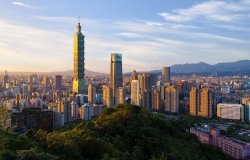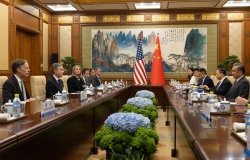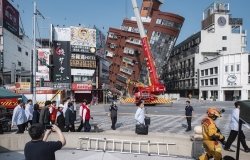"How China Responds to Economic Globalization and Ideological Challenges"
Overview
By Gang Lin
Asia Program Associate
Liu Haifan, Professor and Vice President, Central Party School
Kang Shaobang, Professor and Deputy Director, Institution for International Strategic Studies, Central Party School
China's entry into the World Trade Organization (WTO) by the end of this year will undoubtedly pose severe challenges to China's inefficient economic sectors, but it will also provide new momentum for China's ongoing reform and openness. To respond to the growing globalization, Beijing has recently highlighted its three top tasks in the new century: 1) to continuously promote modernization, 2) to complete China's reunification, and 3) to maintain world peace and advance the well-being of all peoples. Chinese leader Jiang Zemin elaborated extensively with the "three represents" in his July 1st speech during ceremonies of the 80th anniversary of the Chinese Communist Party. Literally, the "three represents" mean that the Party should represent the requirements of the most advanced means of production, the developmental trends of China's advanced culture, and the fundamental interests of China's general public. Pragmatically, the essence of this somewhat theological term is to redefine the Party as an ever-innovating Party corresponding to China's socioeconomic and cultural development, allowing private entrepreneurs to join the Party, a logical result of Beijing's two-decade economic reform and openness.
Interestingly, the Party School of the Central Committee of the Chinese Communist Party, perceived as the "academy of theology" by some China watchers for its traditional role in maintaining ideological purity, has taken a leading role in redefining Beijing's ideological justification. In July 2001 the school, responsible for training high-ranking Party cadres and government officials and headed by China's next top leader, Hu Jintao, sent an academic delegation to the United States for the first time. The delegation, led by Liu Haifan, vice president and professor of economics, participated in a July 26 seminar on China's Reform in a Global Perspective, hosted by the Wilson Center's Asia Program.
In his introductory remarks, Professor Liu emphasized that economic development is Beijing's top priority. In order to develop its economy, China must reduce the number of its state-owned enterprises and develop a more privatized economy. The eight trillion yuan (equivalent to about one trillion U.S. dollars) bank deposits owned by the Chinese people can be directed into new investment. While continuing its control over giant state enterprises by establishing a modern enterprise system, Beijing has left a free hand for medium and small-sized enterprises to transform themselves into the non-state sector. Parallel to China's economic reform, Beijing has deepened its political reform through administrative, personnel and legal innovations. The purpose of Beijing's reform, Liu cautioned, is to improve the Party's leadership in China.
Liu's brief remarks were followed by a lively discussion of China's economic reform and opportunities, Beijing's ideological development, and the impact of globalization on China. In responding to an inquiry on whether the Party has changed from a vanguard of the proletariat into a party for all the people by allowing private entrepreneurs to join the Communist Party, Liu insisted that the Party's nature remains unchanged and only those private entrepreneurs who accept the Party's platform can be recruited into the Party. Kang Shaobang, professor and deputy director of the Party School's Institution for International Strategic Studies, argued that private entrepreneurs do not necessarily represent the "most advanced means of production" in China, which refers to high-tech industries regardless of their type of ownership.
In answering a question on the impact of China's entry into the WTO on its domestic development as well as Beijing's countermeasures, both speakers agreed that economic globalization would bring about certain negative consequences for China, but the influence in general would be positive. Professor Kang pointed out that China's agriculture and the automobile, financial and insurance industries will confront greater challenges in the months to come. Professor Liu noted the weakness of China's high-tech and infrastructure industries. Yet, China can take advantage of information globalization and reemploy the unemployed workers through developing more transportation and energy industries, which are far behind those of the United States. To absorb the extra laborers (between 300 and 400 million) and reduce the gap between urban and rural areas, Liu proposed to develop small industrial townships in the rural areas. China will accelerate its economic reform after joining the WTO, Liu concluded.
This seminar provided a timely assessment of Beijing's development strategy and ideological revision in the wake of economic globalization. It shed light on the connection between China's domestic development and its foreign relations. On the one hand, Beijing has utilized its forthcoming WTO membership as a leverage to justify China's economic and ideological changes. One the other hand, Washington's China policy is contingent upon, to a certain degree, China's domestic development. This may be why American participants in the seminar, like U.S. officials on other occasions, have shown a keen interest in the true meaning of the "three represents." Whatever efforts the Party has made in the recent past to redefine its ruling legitimacy, it will not completely discard its ideological legacy.
Hosted By

Indo-Pacific Program
The Indo-Pacific Program promotes policy debate and intellectual discussions on US interests in the Asia-Pacific as well as political, economic, security, and social issues relating to the world’s most populous and economically dynamic region. Read more
Thank you for your interest in this event. Please send any feedback or questions to our Events staff.











